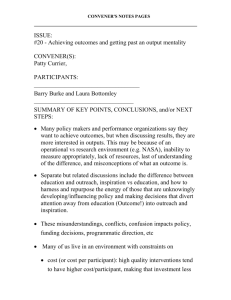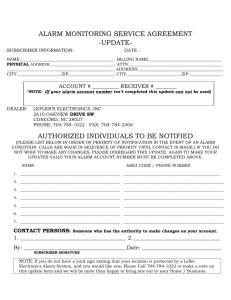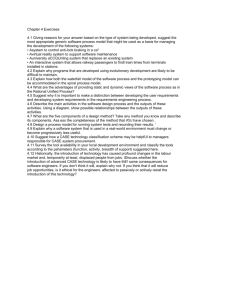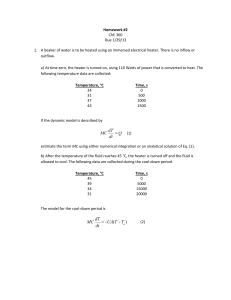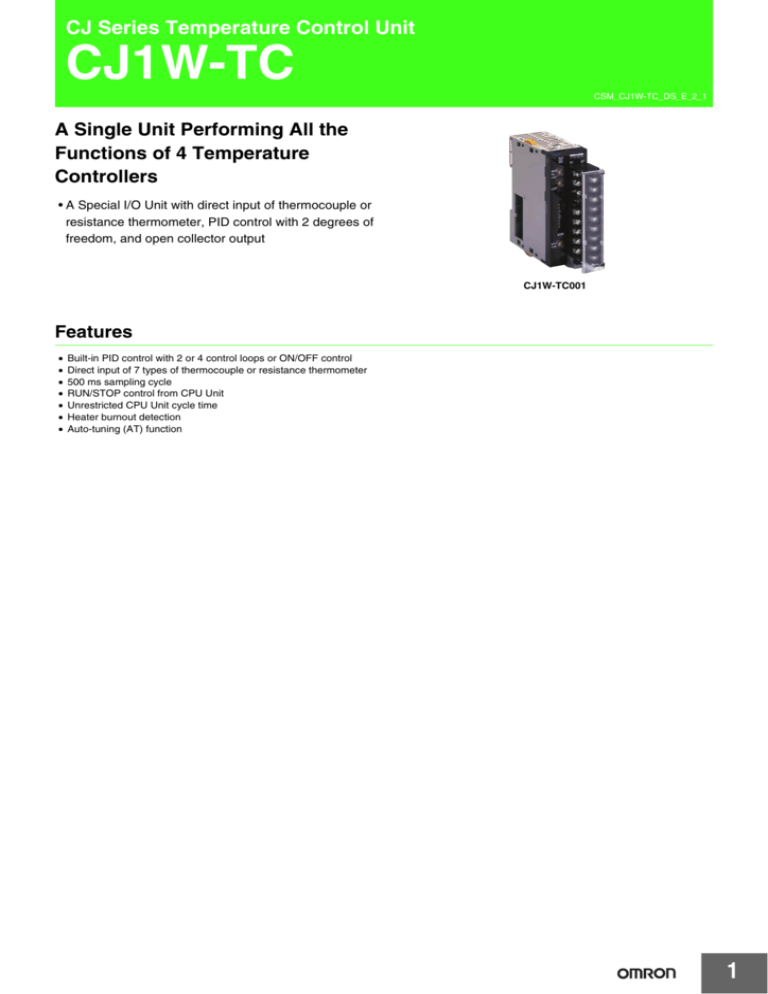
CJ Series Temperature Control Unit
CJ1W-TC
CSM_CJ1W-TC_DS_E_2_1
A Single Unit Performing All the
Functions of 4 Temperature
Controllers
• A Special I/O Unit with direct input of thermocouple or
resistance thermometer, PID control with 2 degrees of
freedom, and open collector output
CJ1W-TC001
Features
•
•
•
•
•
•
•
Built-in PID control with 2 or 4 control loops or ON/OFF control
Direct input of 7 types of thermocouple or resistance thermometer
500 ms sampling cycle
RUN/STOP control from CPU Unit
Unrestricted CPU Unit cycle time
Heater burnout detection
Auto-tuning (AT) function
1
CJ1W-TC
System Configuration
The following diagram shows a basic system with a CJ1W-TC001 Temperature Control Unit (4 control loops, thermocouple inputs, and NPN
outputs) and a CJ1W-TC103 Temperature Control Unit (2 control loops with heater burnout detection, platinum resistance thermometer inputs,
and NPN outputs).
Note that this system configuration is given strictly as an example. When constructing an actual system, check the specifications, performance,
and safety of each component by referring to the respective manuals.
CJ1W-TC001
Four-loop Unit,
Thermocouple,
NPN outputs
CJ1W-TC103
Two-loop Unit, HB alarm, platinum
resistance thermometer, NPN
outputs
Power supply
for outputs
(24 VDC)
Control output
Heater
Temperature Sensor
Thermocouple or platinum
resistance thermometer
1 kW
Current
Transformer
200 VAC
E54-CT1 or E54-CT3
Note: 1. An OMRON E54-CT1 or E54-CT3 Current Transformer must be used as the Current Transformer (CT). Do not use any other Current
Transformer.
2. Turn ON the Stop Bit for the loop to stop temperature control. If PID control is being used and the heater is turned OFF using an operation
switch input to the heater, PID control performance will be adversely affected.
3. To connect this Unit to the NJ series, set pin 3 "Data storage/display format" of the DIP switch to ON.
(The factory setting is OFF)
O
N
1 2 3 4 5 6 7 8
SW3
Data storage/display format
Settings
Settings are not allowed.
OFF
16-bit binary
ON
MODE
This change becomes effective when the Controller is reset, or when the Unit is restarted.
2
CJ1W-TC
Ordering Information
International Standards
• The standards are abbreviated as follows: U: UL, U1: UL (Class I Division 2 Products for Hazardous Locations), C: CSA, UC: cULus, UC1: cULus (Class I Division 2
Products for Hazardous Locations), CU: cUL, N: NK, L: Lloyd, and CE: EC Directives.
• Contact your OMRON representative for further details and applicable conditions for these standards.
Unit
classification
Product
name
Specifications
No. of loops
Temperature
sensor inputs
Open collector NPN
outputs (pulses)
4 loops
4 loops
Temperature
Control Units
CJ1 Special
I/O Units
2 loops, heater
burnout detection
function
Control outputs
−
CJ1W-TC001 *
0.25
−
CJ1W-TC002 *
0.25
−
CJ1W-TC003
0.25
−
CJ1W-TC004
0.25
−
CJ1W-TC101 *
Open collector PNP
outputs (pulses)
0.25
−
CJ1W-TC102 *
Open collector NPN
outputs (pulses)
0.25
−
CJ1W-TC103
Open collector PNP
outputs (pulses)
0.25
−
CJ1W-TC104
Open collector PNP
outputs (pulses)
Thermocouple
input
Open collector NPN
(R, S, K, J, T, B, L) outputs (pulses)
Open collector PNP
outputs (pulses)
4 loops
Open collector NPN
outputs (pulses)
2 loops, heater
burnout detection
function
2 loops, heater
burnout detection
function
Platinum
resistance
thermometer input
(JPt100, Pt100)
Model
0.25
2 loops, heater
burnout detection
function
4 loops
Current
No. of unit consumption (A)
numbers
allocated
5V
24 V
2
Standards
UC1, N, L,
CE
* This unit cannot be used, with the Machine Automation Controller NJ-series.
3
CJ1W-TC
Mountable Racks
NJ system
Model
CPU Rack
CJ1W-TC001
CJ1W-TC002
CJ1W-TC101
CJ1W-TC102
CJ system (CJ1, CJ2)
Expansion Rack
CPU Rack
Expansion Backplane
10 Units
10 Units
(per Expansion Backplane)
Not supported
CJ1W-TC003
CJ1W-TC004
CJ1W-TC103
CJ1W-TC104
10 Units
10 Units
(per Expansion Backplane)
Specifications
General Specifications
Item
Specification
Unit classification CJ-series Special I/O Unit
Compatible Racks CJ-series CPU Rack or CJ-series Expansion Rack
Max. number of
Units
10 Units/Rack max. (CPU Rack or Expansion Rack)
Special I/O Unit Area (960 words)
CIO 2000 to CIO 2959
CPU Unit data
areas for data
storage/exchange
DM words allocated to Special I/O
Units (9,600 words)
D20000 to D29599
Insulation
resistance
CPU Unit to
Temperature
Control Unit
• Set point (SP)
• Operating commands
• RUN/STOP control
• Start/Stop AT
• Write commands
• Heater burnout set value
Temperature
Control Unit to
CPU Unit
• Process value (PV)
• Set point (SP)
• Status
• Heater current monitor
10 words/Unit transferred when
power is turned ON or Unit is
restarted
CPU Unit to
Temperature
Control Unit
• Alarm mode
• Alarm hysteresis
90 words/Unit for regular data
exchange
• Alarm value
• Input compensation value
Two-way transfer • Control period
between CPU Unit • Hysteresis
and Temperature • Proportional band
Control Unit
• Integral time
• Derivative time
• Output monitor
20 words/Unit for constant data
exchange (6 output words and 14
input words)
20 MΩ min. (at 500 VDC) between the following points:
• All output and NC terminals and external AC terminals (Power Supply Unit)
• All input terminals and external AC terminals (Power Supply Unit)
• All input terminals and all output terminals
• All external DC terminals (inputs, outputs, and NC) and the FG plate
• Between input terminals (sensor and CT inputs)
• I/O terminals and NC terminals
2,000 VAC 50/60 Hz for 1 min., detected current: 1 mA
• The output terminals/NC terminals and external AC terminals (Power Supply Unit)
1,000 VAC 50/60 Hz for 1 min., detected current: 1 mA
• Input terminals and external AC terminals (Power Supply Unit)
Dielectric strength • Input terminals and output terminals
• External DC terminals (inputs, outputs, and NC) and the FG plate
500 VAC 50/60 Hz for 1 min., detected current: 1 mA
• Between input terminals (sensor and CT inputs)
• I/O terminals and NC terminals
Internal current
consumption
250 mA max., 5 VDC
Other
Other general specifications conform to the CJ-series general specifications.
Dimensions
31 × 90 × 65 mm (W × H × D)
Weight
150 g max.
4
CJ1W-TC
Characteristics
Item
Specification
Model number
CJ1W-TC00@
CJ1W-TC10@
Temperature sensor
Thermocouple: R, S, K, J, T, L, B
Platinum resistance thermometer: Pt100, JPt100
Number of loops
4 loops or 2 loops with heater burnout detection *1
Control output and
heater burnout alarm
output
NPN or PNP outputs, both with short-circuit protection *1
External power supply voltage: 24 VDC +10%
−15%
Max. switching capacity: 100 mA (per output)
Leakage current: 0.3 mA max.
Residual voltage: 3 V max.
Temperature control
method
ON/OFF control or PID control with two degrees of freedom (Set with pin 6 on the Unit's DIP switch.)
Control operation
Forward or reverse operation (Set with pins 4 and 5 on the Unit's DIP switch.)
RUN/STOP control
Supported (Controlled from the CPU Unit through bits allocated in the Special I/O Unit area.)
Operation with CPU
Unit in PROGRAM
mode
The Temperature Control Unit can be set to continue operating or stop operating when the CPU Unit is in PROGRAM
mode. (Set with pin 1 on the Unit's DIP switch.)
Auto/Manual switch for
operational output
None
Autotuning (AT) of PID
constant
Supported (Controlled from the CPU Unit through bits allocated in the Special I/O Unit area.)
Indication accuracy
Celsius: ±0.3% of PV or ±1°C (whichever is larger) ± 1 digit max.
Fahrenheit: ±0.3% of PV or ±2°F (whichever is larger) ± 1
digit max.
• L and −100°C or less for K and T are ±2°C ± 1 digit max.
• 200°C or less for R and S is ±3°C ± 1 digit max.
• No accuracy is specified for 400°C or less for B *2
Celsius: ±0.3% of PV or ±0.8°C (whichever is larger) ± 1
digit max.
Fahrenheit: ±0.3% of PV or ±1.6°F (whichever is larger) ±
1 digit max.
Hysteresis (when using
0.0 to 999.9 °C or °F (0.1 °C or °F units)
ON/OFF control)
Proportional band
0.1 to 999.9 °C or °F (0.1 °C or °F units)
Integral (reset) time
0 to 9,999 s (one-second units)
Derivative (rate) time
0 to 9,999 s (one-second units)
Control period
1 to 99 s (one-second units)
Sampling period
500 ms (4 loops)
Output refresh period
500 ms (4 loops)
Display refresh period
500 ms (4 loops)
Input compensation
value
−99.9 to 999.9 °C or °F (0.1 °C or °F units)
Alarm output setting
range
−999 to 9,999 °C or °F (1 °C or °F units)
The setting range will be −99.9 to 999.9 °C or °F (0.1 °C or °F units) for K or J with decimal point mode, or platinum
resistance thermometer.
External terminal
connections
Removable terminal block with 18 points (M3 screws)
Effect on the CPU Unit's
0.4ms
cycle time
*1. The last three digits of the model number indicate the Unit's features:
CJ1W-TC @ 0 @
Output type 1: NPN outputs, four-loop control outputs
2: PNP outputs, four-loop control outputs
3: NPN outputs, two-loop control outputs and heater
burnout alarm outputs
4: PNP outputs, two-loop control outputs and heater
burnout alarm outputs
Always 0.
Input type 0: Thermocouple input
1: Platinum resistance thermometer input
*2. Indication accuracy of thermocouples
• Accuracy ratings are given for the Temperature Control Unit used in a set with a cold-junction compensator (on the terminal block). Always
use the Unit and terminal block in a set. There are labels with serial numbers attached to the terminal blocks and Units to help keep track of
the sets.
• When returning a thermocouple-type Temperature Control Unit for repair, always return the Unit and the terminal block (with the cold-junction
compensator) as a set.
5
CJ1W-TC
Heater Burnout (HB) Alarm
Item
Specification
Maximum heater current
Single-phase AC, 50 A
Indication accuracy of input current
±5% of full scale ± 1 digit max.
Heater burnout alarm setting range
0.1 to 49.9 A (0.1 A units)
The heater burnout detection function will not operate if the set value is set to 0.0 A or 50.0 A.
(When the SV is 0.0 A, the heather burnout alarm will be OFF. When the SV is 50.0 A, the heater burnout
alarm will be ON.)
Min. detectable ON time *
200 ms
* If the control output is ON for less than 200 ms, the heater burnout detection function will not operate and heater current measurement will not
be performed.
Current Transformer (CT) Ratings
Item
E54-CT1
E54-CT3
Max. continuous heater current
50A
Dielectric strength
1,000 VAC (1 min.)
120 A *
Vibration resistance
50 Hz, 98 m/s2
Weight
Approx. 11.5 g
Approx. 50 g
Accessories
None
Contacts (2)
Plugs (2)
Note: Do not use any Current Transformer (CT) other than the OMRON E54-CT1 or E54-CT3 Current Transformer.
* The maximum continuous heater current that can be detected at a CJ1W-TC@@@ Temperature Control Unit is 50 A.
6
CJ1W-TC
Input Function Block Diagrams
Four-loop Units
Temperature Control Unit
Controller
Loop 1
ON/OFF control
PID control
Input 1
Control
output 1
Temperature
input
Control
output
Forward/
reverse
switching
CPU Unit
°C
BCD
°F
Binary
Special I/O
Unit Area
Alarm 1
Alarm 2
Loop 2
Input 2
Same as 1.
Control
output 2
Loop 3
Input 3
Same as 1.
Control
output 3
Loop 4
Input 4
Same as 1.
Control
output 4
7
CJ1W-TC
Two-loop Units with Heater Burnout Alarm
When the Unit is used with CJ-series CPU unit
CPU Unit
Temperature Control Unit
Controller
Loop 1
ON/OFF control
°C
BCD
°F
Binary
Special I/O
Unit Area
PID control
Input 1
Temperature
input
Control
output 1
Control
output
CT
input 1
CT input
Heater
burnout
alarm
output 1
Heater
burnout
alarm
Alarm 1
Forward/
reverse
switching
Alarm 2
Loop 2
Input 2
Control
output 1
CT input 2
Same as 1.
HB alarm
output 2
When the Unit is used with NJ-series CPU unit
Temperature Control Unit
Input 1
Temperature
input
Control
output 1
Control
output
CT
input 1
CT input
Heater
burnout
alarm
output 1
Special I/O
Unit Area
ºC
Controller
Loop 1
CPU Unit
PV/SP, etc.
ºF
ON/OFF control
PID control
Alarm 1
Forward/
reverse
switching
Alarm 2
Heater
burnout
alarm
Loop 2
Input 2
Control
output 1
CT input 2
Same as 1.
Heater
burnout
alarm
output 2
8
CJ1W-TC
Input Specifications
When the Unit is used with CJ-series CPU unit
A switch on the front of the Unit (pin 3 of the DIP switch) selects whether the Temperature Control Unit's data is stored and indicated as 4-digit
BCD or binary (i.e., 4-digit hexadecimal). Pin 2 of the DIP switch selects whether the temperature is indicated in °C or °F.
The indicated range will be within ±20°C or ±20°F of the setting ranges shown in the following table. *1
Thermocouple Input Setting Ranges
No.
Input type
°C
°F
16-bit binary
BCD
16-bit binary
BCD
0
K: −200 to 1,300°C
(−300 to 2,300°F)
FF38 to FFFF to 0514
(−200 to −1 to 1,300)
F200 to 1300
(−200 to 1,300)
FED4 to FFFF to 08FC
(−300 to −1 to 2,300)
F300 to 2300
(−300 to 2,300)
1
K: 0.0 to 500°C
(0.0 to 900.0°F)
0000 to 1388
(0.0 to 500.0)
0000 to 5000
(0.0 to 500.0)
0000 to 2328
(0.0 to 900.0)
0000 to 9000
(0.0 to 900.0)
2
J: −100 to 850°C
(−100 to 1,500°F)
FF9C to FFFF to 0352
(−100 to −1 to 850)
F100 to 0850
(−100 to 850)
FF9C to FFFF to 05DC
(−100 to −1 to 1,500)
F100 to 1500
(−100 to 1,500)
3
J: 0.0 to 400°C
(0.0 to 750.0°F)
0000 to 0FA0
(0.0 to 400.0)
0000 to 4000
(0.0 to 400.0)
0000 to 1D4C
(0.0 to 750.0)
0000 to 7500
(0.0 to 750.0)
4
T: −200.0 to 400.0°C
(−300.0 to 700.0°F)
F830 to FFFF to 0FA0
(−200.0 to −0.1 to 400.0)
F999 to 4000
(−99.9 to 400.0) *3
F448 to FFFF to 1B58
(−300.0 to −0.1 to 700.0)
F999 to 7000
(−99.9 to 700.0) *3
5
L: −100 to 850°C
(−100 to 1,500°F)
FF9C to FFFF to 0352
(−100 to −1 to 850)
F100 to 0850
(−100 to 850)
FF9C to FFFF to 05DC
(−100 to −1 to 1,500)
F100 to 1500
(−100 to 1,500)
6
L: 0.0 to 40 °C
(0.0 to 750.0°F)
0000 to 0FA0
(0.0 to 400.0)
0000 to 4000
(0.0 to 400.0)
0000 to 1D4C
(0.0 to 750.0)
0000 to 7500
(0.0 to 750.0)
7
R: 0 to 1,700°C
(0 to 3,000 °F)
0000 to 06A4
(0 to 1,700)
0000 to 1700
(0.0 to 1,700)
0000 to 0BB8
(0 to 3,000)
0000 to 3000
(0.0 to 3,000)
8
S: 0 to 1,700°C
(0 to 3,000 °F)
0000 to 06A4
(0 to 1,700)
0000 to 1700
(0.0 to 1,700)
0000 to 0BB8
(0 to 3,000)
0000 to 3000
(0.0 to 3,000)
9
B: 100 to 1,800°C
(300 to 3,200 °F) *2
0064 to 0708
(100 to 1,800)
0100 to 1800
(100 to 1,800)
012C to 0C80
(300 to 3,200)
0300 to 3200
(300 to 3,200)
Platinum Resistance Thermometer Input Setting Ranges
No
Input type
°C
°F
16-bit binary
BCD
16-bit binary
BCD
0
Pt100:
−200.0 to 650.0 °C
(−300.0 to 1,200.0 °F)
F830 to FFFF to 1964
(−200.0 to −0.1 to 650.0)
F999 to 6500
(−99.9 to 650.0) *3
F448 to FFFF to 2EE0
(−300.0 to −0.1 to 1,200.0)
F999 to 9999
(−99.9 to 999.9) *3
1
JPt100:
−200.0 to 650.0 °C
(−300.0 to 1,200.0 °F)
F830 to FFFF to 1964
(−200.0 to −0.1 to 650.0)
F999 to 6500
(−99.9 to 650.0) *3
F448 to FFFF to 2EE0
(−300.0 to −0.1 to 1,200.0)
F999 to 9999
(−99.9 to 999.9) *3
2 to 9
−
Settings 2 through 9 are not allowed.
Settings 2 through 9 are not allowed.
Note: When the input type setting switch has been changed, the SV and input compensation values will change as follows:
• If the SV exceeds the setting range, it will be fixed at the lower limit or upper limit of the setting range.
• The position of the decimal point will change if necessary.
For example, when the temperature range is changed by changing the input type setting switch from 0 (K-type thermocouple with a
temperature range of −200 to 1,300°C) to 1 (K-type thermocouple with a temperature range of 0.0 to 500.0°C), an SV of 200°C would be
changed to 20.0°C.
*1. If the allowed indication range is exceeded, a sensor error will occur, the corresponding Sensor Error Flag will be turned ON, and the PV will
contain the data "CCCC." When a sensor error occurs, that control loop's control output will be turned OFF. The alarm function will operate
because the PV indicates an abnormally high temperature.
*2. The lower limit for B thermocouple is 0°C or 0°F.
*3. The indicator range for BCD display will be clamped at the lower or upper limit in the region between the lower or upper limit of the setting range
and the point where a sensor error occurs.
When the display units are 0.1°C or 0.1°F, the display's lower limit value is −99.9 and the upper limit value is 999.9.
9
CJ1W-TC
When the Unit is used with NJ-series CPU unit
Pin 2 of the DIP switch selects whether the temperature is indicated in °C or °F.
The indicated range will be within ±20°C or ±20°F of the setting ranges shown in the following table.
If the allowed indication range is exceeded, a sensor error will occur. The corresponding sensor error bit will be turned ON and the PV (process
value) will contain the data "-13108".
When a sensor error occurs, that control loop's control output will be turned OFF. The alarm function will operate because the PV indicates an
abnormally high temperature.
Thermocouple Input Setting Ranges
Sensor
Set value
Input type
0
K
1
2
J
3
Thermocouple
4
T
5
L
6
Temperature range
-200 to 1300°C/-300 to 2300°F
0.0 to 500.0°C/0.0 to 900.0°F
-100 to 850°C/-100 to 1500°F
0.0 to 400.0°C/0.0 to 750.0°F
-200.0 to 400.0°C/-300.0 to 700.0°F
-100 to 850°C/-100 to 1500°F
0.0 to 400.0°C/0.0 to 750.0°F
7
R
0 to 1700°C/0 to 3000°F
8
S
0 to 1700°C/0 to 3000°F
9
B*
100 to 1800°C/300 to 3200°F
Note: When the Input Type Switch has been changed, the SV and input compensation values will change as follows:
• If the SV exceeds the setting range, it will be fixed at the lower limit or upper limit of the setting range.
• The position of the decimal point will change if necessary.
* The lower-limit indication for B-type thermocouples is 0°C or 0°F.
For example, when the temperature range is changed by changing the Input Type Switch from 0 (K-type thermocouple with a temperature range
of −200 to 1,300°C) to 1 (K-type thermocouple with a temperature range of 0.0 to 500.0°C), an SV of 200°C will be changed to 20.0°C.
Platinum Resistance Thermometer Input Setting Ranges
Sensor
Platinum Resistance
Thermometer
Set value
Input type
0
Pt100
1
JPt100
2 to 9
Temperature range
-200.0 to 650.0°C/-300.0 to 1200.0°F
-200.0 to 650.0°C/-300.0 to 1200.0°F
Do not set 2 through 9.
10
CJ1W-TC
Part Names and Functions
Part Names
Output Indicators
Status
Indicators
Unit Number
Switches
7 8
4
0 1
5 6
9
Terminal
Block
2 3
7 8
4
0 1
5 6
9
2 3
Connector
DIP Switch
7 8
4
0 1
5 6
9
2 3
Input Type
Switch
DIN Track
Mounting Pin
Sliding Latch
Terminal Block
Lock Lever
Sliding Latch
Indicators
Status Indicators
The Status Indicators indicate the operating status of the Temperature Control Unit, as explained in the following table.
Indicator
RUN
ERC
ERH
Name
RUN Indicator
Temperature Control Unit Error
CPU Unit Error
Color
Green
Red
Red
Status
Lit
Meaning
Normal operating status
Not lit
Temperature control is stopped.
Lit
An error occurred in the Temperature Control Unit itself, such as
a Sensor Error or Initialization Error.
Not lit
Normal operating status
Lit
An error occurred in the CPU Unit.
Not lit
Normal operating status
Output Indicators
The Output Indicators light to indicate when the corresponding Temperature Control Unit output is ON.
11
CJ1W-TC
Output Circuits
The following diagrams show the internal output circuits.
Output Circuits
NPN Outputs
(CJ1W-TC@01 and CJ1W-TC@03)
Internal circuits
24 V
COM
Output Indicator
PNP Outputs
(CJ1W-TC@02 and CJ1W-TC@04)
Internal circuits
COM
0V
Output Indicator
12
CJ1W-TC
Wiring
Terminal Wiring Examples
Thermocouple Temperature Control Units
CJ1W-TC001
(4 loops, NPN outputs)
Input 2 −
Input 2 +
Cold-junction comp.
Cold-junction comp.
Input 4 −
Input 4 +
Output 2
Output 4
0 V COM (−)
CJ1W-TC002
(4 loops, PNP outputs)
B1
B2
B3
B4
B5
B6
B7
B8
B9
A1
A2
A3
A4
A5
A6
A7
A8
A9
Input 1 −
Input 1 +
N.C.
N.C.
Input 3 −
Input 3 +
Output 1
Output 3
24 V
CJ1W-TC003
(2 loops, NPN outputs, HB alarm)
Input 2 −
Input 2 +
Cold-junction comp.
Cold-junction comp.
CT input 2
CT input 2
Output 2
HB output 2
0 V COM (−)
B1
B2
B3
B4
B5
B6
B7
B8
B9
Input 2 −
Input 2 +
Cold-junction comp.
Cold-junction comp.
Input 4 −
Input 4 +
Output 2
Output 4
0V
B1
B2
B3
B4
B5
B6
B7
B8
B9
A1
A2
A3
A4
A5
A6
A7
A8
A9
Input 1 −
Input 1 +
N.C.
N.C.
Input 3 −
Input 3 +
Output 1
Output 3
24 V COM (+)
A1
A2
A3
A4
A5
A6
A7
A8
A9
Input 1 −
Input 1 +
N.C.
N.C.
CT input 1
CT input 1
Output 1
HB output 1
24 V COM (+)
A1
A2
A3
A4
A5
A6
A7
A8
A9
Input 1 B'
Input 1 B
Input 1 A
Input 3 B'
Input 3 B
Input 3 A
Output 1
Output 3
24 V COM (+)
A1
A2
A3
A4
A5
A6
A7
A8
A9
Input 1 B'
Input 1 B
Input 1 A
N.C.
CT input 1
CT input 1
Output 1
HB output 1
24 V COM (+)
CJ1W-TC004
(2 loops, PNP outputs, HB alarm)
A1
A2
A3
A4
A5
A6
A7
A8
A9
Input 1 −
Input 1 +
N.C.
N.C.
CT input 1
CT input 1
Output 1
HB output 1
24 V
Input 2 −
Input 2 +
Cold-junction comp.
Cold-junction comp.
CT input 2
CT input 2
Output 2
HB output 2
0V
B1
B2
B3
B4
B5
B6
B7
B8
B9
Note: Do not connect any wiring to the N.C. terminals.
Platinum Resistance Thermometer Temperature Control Units
CJ1W-TC101
(4 loops, NPN outputs)
Input 2 B'
Input 2 B
Input 2 A
Input 4 B'
Input 4 B
Input 4 A
Output 2
Output 4
0 V COM (−)
CJ1W-TC102
(4 loops, PNP outputs)
B1
B2
B3
B4
B5
B6
B7
B8
B9
A1
A2
A3
A4
A5
A6
A7
A8
A9
Input 1 B'
Input 1 B
Input 1 A
Input 3 B'
Input 3 B
Input 3 A
Output 1
Output 3
24 V
CJ1W-TC103
(2 loops, NPN outputs, HB alarm)
Input 2 B'
Input 2 B
Input 2 A
N.C.
CT input 2
CT input 2
Output 2
HB output 2
0 V COM (−)
B1
B2
B3
B4
B5
B6
B7
B8
B9
Input 2 B'
Input 2 B
Input 2 A
Input 4 B'
Input 4 B
Input 4 A
Output 2
Output 4
0V
B1
B2
B3
B4
B5
B6
B7
B8
B9
CJ1W-TC104
(2 loops, PNP outputs, HB alarm)
A1
A2
A3
A4
A5
A6
A7
A8
A9
Input 1 B'
Input 1 B
Input 1 A
N.C.
CT input 1
CT input 1
Output 1
HB output 1
24 V
Input 2 B'
Input 2 B
Input 2 A
N.C.
CT input 2
CT input 2
Output 2
HB output 2
0V
B1
B2
B3
B4
B5
B6
B7
B8
B9
Note: Do not connect any wiring to the N.C. terminals.
13
CJ1W-TC
Dimensions
(Unit: mm)
CJ1W-TC@@@
89
65
27
31
7 8
4
0 1
5 6
9
2 3
7 8
4
0 1
5 6
9
90
2 3
7 8
4
0 1
5 6
9
27
2 3
Current Transformer (Sold Separately)
E54-CT1
E54-CT3
21
15
2.8
2.36 dia.
9
30
7.1
5.8 dia.
25
10.5
40×40
12 dia.
3
Two M3
holes,
Depth 4
Two 3.5 dia. holes
15
40
10
30
30
Related Manuals
Manual name
Cat. No.
CJ-series Temperature
Control Units Operation
W491
Manual for NJ-series
CPU Unit
CJ Series Temperature
Control Units Operation W396
Manual
Model numbers
Application
Description
CJ1W-TC003/
-TC004/-TC103/
-TC104
Leaning the functions and application
methods of the CJ-series Temperature
Control Units used in an NJ-series
configuration.
Describes the application methods of the CJseries
Temperature Control Units used in an NJseries configuration.
CJ1W-TC@@@
Leaning the functions and application Describes the application methods of the CJmethods of the CJ-series Temperature series
Control Units.
Temperature Control Units.
14
Read and Understand This Catalog
Please read and understand this catalog before purchasing the products. Please consult your OMRON representative if you have any questions or
comments.
Warranty and Limitations of Liability
WARRANTY
OMRON's exclusive warranty is that the products are free from defects in materials and workmanship for a period of one year (or other period if specified)
from date of sale by OMRON.
OMRON MAKES NO WARRANTY OR REPRESENTATION, EXPRESS OR IMPLIED, REGARDING NON-INFRINGEMENT, MERCHANTABILITY, OR
FITNESS FOR PARTICULAR PURPOSE OF THE PRODUCTS. ANY BUYER OR USER ACKNOWLEDGES THAT THE BUYER OR USER ALONE HAS
DETERMINED THAT THE PRODUCTS WILL SUITABLY MEET THE REQUIREMENTS OF THEIR INTENDED USE. OMRON DISCLAIMS ALL OTHER
WARRANTIES, EXPRESS OR IMPLIED.
LIMITATIONS OF LIABILITY
OMRON SHALL NOT BE RESPONSIBLE FOR SPECIAL, INDIRECT, OR CONSEQUENTIAL DAMAGES, LOSS OF PROFITS OR COMMERCIAL LOSS
IN ANY WAY CONNECTED WITH THE PRODUCTS, WHETHER SUCH CLAIM IS BASED ON CONTRACT, WARRANTY, NEGLIGENCE, OR STRICT
LIABILITY.
In no event shall the responsibility of OMRON for any act exceed the individual price of the product on which liability is asserted.
IN NO EVENT SHALL OMRON BE RESPONSIBLE FOR WARRANTY, REPAIR, OR OTHER CLAIMS REGARDING THE PRODUCTS UNLESS
OMRON'S ANALYSIS CONFIRMS THAT THE PRODUCTS WERE PROPERLY HANDLED, STORED, INSTALLED, AND MAINTAINED AND NOT
SUBJECT TO CONTAMINATION, ABUSE, MISUSE, OR INAPPROPRIATE MODIFICATION OR REPAIR.
Application Considerations
SUITABILITY FOR USE
OMRON shall not be responsible for conformity with any standards, codes, or regulations that apply to the combination of products in the customer's
application or use of the products.
At the customer's request, OMRON will provide applicable third party certification documents identifying ratings and limitations of use that apply to the
products. This information by itself is not sufficient for a complete determination of the suitability of the products in combination with the end product,
machine, system, or other application or use.
The following are some examples of applications for which particular attention must be given. This is not intended to be an exhaustive list of all possible
uses of the products, nor is it intended to imply that the uses listed may be suitable for the products:
Outdoor use, uses involving potential chemical contamination or electrical interference, or conditions or uses not described in this catalog.
Nuclear energy control systems, combustion systems, railroad systems, aviation systems, medical equipment, amusement machines, vehicles,
safety equipment, and installations subject to separate industry or government regulations.
Systems, machines, and equipment that could present a risk to life or property.
Please know and observe all prohibitions of use applicable to the products.
NEVER USE THE PRODUCTS FOR AN APPLICATION INVOLVING SERIOUS RISK TO LIFE OR PROPERTY WITHOUT ENSURING THAT THE
SYSTEM AS A WHOLE HAS BEEN DESIGNED TO ADDRESS THE RISKS, AND THAT THE OMRON PRODUCTS ARE PROPERLY RATED AND
INSTALLED FOR THE INTENDED USE WITHIN THE OVERALL EQUIPMENT OR SYSTEM.
PROGRAMMABLE PRODUCTS
OMRON shall not be responsible for the user's programming of a programmable product, or any consequence thereof.
Disclaimers
CHANGE IN SPECIFICATIONS
Product specifications and accessories may be changed at any time based on improvements and other reasons.
It is our practice to change model numbers when published ratings or features are changed, or when significant construction changes are made.
However, some specifications of the products may be changed without any notice. When in doubt, special model numbers may be assigned to fix or
establish key specifications for your application on your request. Please consult with your OMRON representative at any time to confirm actual
specifications of purchased products.
DIMENSIONS AND WEIGHTS
Dimensions and weights are nominal and are not to be used for manufacturing purposes, even when tolerances are shown.
PERFORMANCE DATA
Performance data given in this catalog is provided as a guide for the user in determining suitability and does not constitute a warranty. It may represent the
result of OMRON’s test conditions, and the users must correlate it to actual application requirements. Actual performance is subject to the OMRON
Warranty and Limitations of Liability.
ERRORS AND OMISSIONS
The information in this document has been carefully checked and is believed to be accurate; however, no responsibility is assumed for clerical,
typographical, or proofreading errors, or omissions.
2011.12
In the interest of product improvement, specifications are subject to change without notice.
OMRON Corporation
Industrial Automation Company
http://www.ia.omron.com/
(c)Copyright OMRON Corporation 2011 All Right Reserved.


